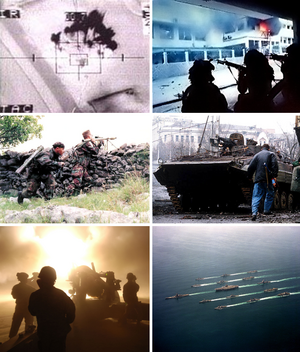Ochoccola War
The Ochoccola War, also known as the Cuthish invasion of Ochoccola and the Ochoccola Crisis, was an armed conflict fought between Cuthland and Ochoccola during the spring of 1994. Fighting occured primarily in Ochoccola and the surrounding ocean and airspace, with spillovers to Akawhk briefly bringing Mascylla into the conflict during the Akawhk Crisis. A major turning point in the Great Game, the Ochoccola War renewed tensions between Cuthland and Mascylla and led to a realignment of the Auroran world order, with the Mageiros League usurping the !Warsaw Pact as the primary geopolitical adversary for the Berean Defense Treaty Association (BDTA).
After the fall of communism in 1990, Ochoccola transitioned to a democracy under the administration of Paramount Chief Lamochattee. Lamochattee's government began to strengthen ties with the BDTA powers, signing a free trade agreement with Mascylla, Lavaria, Falland, and Sarrac in 1992. Cuthland had maintained warm diplomatic and economic ties with communist Ochoccola, and was a major importer of Ochoccolan uranium. The Cuthish government publicly expressed concerns that Ochoccola's accession to the BDTA was imminent, and would jeopardize Cuthish interests in Alvinia. Many Cuthish officials further feared a United Godrica should Ochoccola and Chelagey, its northern neighbor, unify, creating a BDTA-aligned regional hegemon in Alvinia. Cuthland subsequently began sending covert support to the Ochoccolan National Front (ONF), a far-right political party that had emerged as the primary opposition to Lamochattee's administration. Backed by Cuthish funding, the ONF's Kikikwawason challenged Lamochattee for Paramount Chief in the 1993 Ochoccolan general election, losing by a slim margin. Both the ONF and Cuthish government alleged widespread voter fraud and rejected the results of the election, resulting in a wave of unrest as protests and violence broke out in major cities across the country. Ochoccolan officials accused the Cuthish government of orchestrating the protests, a claim echoed by the BDTA and its member states. In late February of 1994, elements of the Royal Cuthish Navy began operating near the Ochoccolan coast, prompting an emergency meeting of the Assembly of Nations Security Council to address the rapidly escalating crisis. On 10 March 1994, the Cuthish government demanded that that the Ochoccolan government nullify the results of the election and allow Cuthish peacekeepers and election observers to enter the country. Lamochattee refused, calling on the BDTA to immediately allow Ochoccola's accession to the organization and intervene militarily in the crisis. Cuthland responded by severing diplomatic ties with Ochoccola on 20 March.
The Cuthish invasion began with a naval incursion into Ochoccolan territorial waters during the early morning hours of 27 March. Cuthish forces engaged the Ochoccolan Navy on multiple fronts, with fighting in the Godrican Sea producing one of the largest naval battles since the Great War. The Cuthish Navy quickly achieved naval supremacy and blockaded Ochoccolan ports, prefacing an 11 day long air and naval bombardment of the nation's military and civilian infrastructure. On 8 March, Cuthish ground forces landed at Oktamulke Beach, establishing a beachhead and pushing south towards Socapatoy. Ochoccolan forces consolidated around Cahulga and slowed the Cuthish advance, inflicting heavy casualties during the ensuing battle for the city. Cuthland attempted to draw Ochoccolan forces away from Cahulga by seizing the northwestern port city of Pinhoti, but suffered a stunning defeat at Lyndon Ridge during the night of 20-21 May after encountering an unexpectedly large Ochoccolan armored formation.
On 24 May, the Royal Cuthish Air Force carried out an airstrike on a Mascyllary supply convoy operating near the city. Mascyllary and Cuthish forces briefly clashed, leading to an intense standoff around the Mascyllary overseas territory of Akawhk as both nations deployed nuclear weapons to Alvinia. TBD
